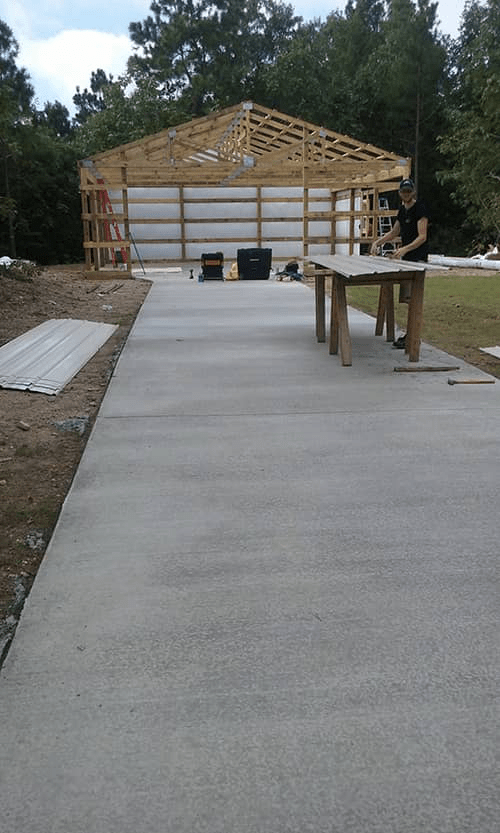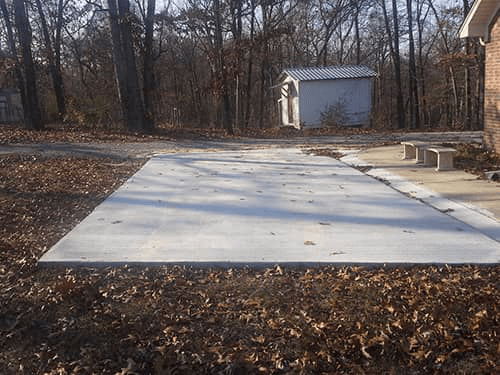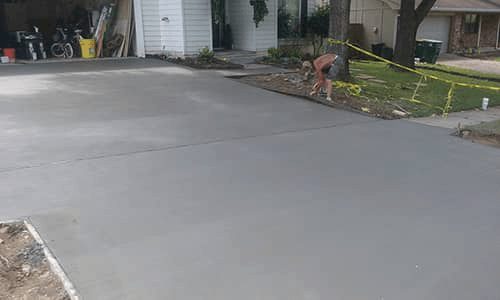When it comes to choosing the right material for your driveway, homeowners often find themselves weighing the pros and cons of concrete and asphalt. Both materials are popular for residential driveways, but they offer different benefits and drawbacks.
In this blog, we will discuss the specifics of concrete and asphalt driveways, helping you make an informed decision based on your needs, budget, and preferences.
Material Overview: Concrete and Asphalt
Concrete
Concrete driveways are made from a mixture of cement, water, and aggregates like sand and gravel. This combination creates a hard and durable surface that can last for decades. Concrete’s versatility allows for various finishes and colors, making it a popular choice for homeowners seeking a custom look.
Asphalt
Asphalt, on the other hand, is a mixture of bitumen (a sticky, black, and highly viscous liquid), sand, and small stones. It is known for its dark color and smooth finish. Asphalt driveways are often chosen for their cost-effectiveness and quick installation process.
Durability and Maintenance
Concrete
Concrete driveways can last up to 30 years or more with proper care. They are resistant to weather-related damage but can crack over time due to ground movement or heavy loads. Maintenance typically involves sealing cracks and resealing the surface every few years to protect against stains and weathering.

Asphalt
Asphalt driveways generally last between 15 to 20 years. They require more frequent maintenance than concrete, including resealing every 3 to 5 years and patching potholes or cracks as they appear. However, asphalt is less susceptible to cracking from freeze-thaw cycles, making it a suitable choice for colder climates.
Installation and Cost
Concrete
Installing a concrete driveway is more labor-intensive and time-consuming than asphalt. The process involves preparing the ground, creating forms, pouring the concrete, and allowing it to cure for several days. As a result, concrete driveways are generally more expensive than asphalt ones.
Asphalt
Asphalt driveways can be installed relatively quickly, often in a day or two, depending on the size of the driveway. The material is also less expensive than concrete, making it a budget-friendly option. However, the total cost can vary depending on factors like the thickness of the asphalt and the complexity of the job.
Aesthetic and Design Options
Concrete
Concrete driveways offer a wide range of design options, including stamped patterns, colored concrete, and exposed aggregate finishes. These options allow homeowners to customize the look of their driveway to match their home’s style and personal taste.
Asphalt
Asphalt driveways have a more uniform appearance, typically in shades of black or dark gray. While they offer fewer design options than concrete, some homeowners appreciate the sleek, clean look of a new asphalt driveway.
Environmental Considerations
Concrete
Concrete driveways have a longer lifespan, which means less frequent replacement and, consequently, less waste. However, the production of cement, a key ingredient in concrete, is energy-intensive and releases significant amounts of carbon dioxide.

Asphalt
Asphalt is recyclable, and old asphalt can be ground up and reused in new paving projects. This reduces the environmental impact of asphalt driveways. However, the production of asphalt also involves the use of fossil fuels, contributing to greenhouse gas emissions.
Climate Considerations
Concrete
Concrete can be sensitive to extreme weather conditions. In areas with severe winters, the freeze-thaw cycles can cause cracking and damage over time. Additionally, concrete can retain heat, making it less comfortable to walk on during hot summers.
Asphalt
Asphalt’s flexibility makes it better suited to handle freeze-thaw cycles, reducing the likelihood of cracking in colder climates. However, asphalt can become soft and sticky in high temperatures, which might lead to surface deformations during hot weather.
Safety and Comfort
Concrete
Concrete provides a rigid, stable surface that is less likely to develop ruts or depressions over time. Its light color reflects sunlight, making it cooler to the touch in summer. Concrete also offers better traction when wet, reducing the risk of slips and falls.

Asphalt
Asphalt’s darker color absorbs heat, which can help melt snow and ice in the winter, making it a practical choice in snowy regions. However, its smooth surface can become slippery when wet or icy.
Repair and Longevity
Concrete
While concrete is generally long-lasting, repairs can be noticeable and difficult to match with the existing surface. Extensive damage might require replacing entire sections, which can be costly.
Asphalt
Asphalt is easier to repair than concrete, with patching and resealing often being sufficient to address minor issues. However, its shorter lifespan means it will likely need to be replaced more often than concrete.
Resale Value and Curb Appeal
Concrete
A well-maintained concrete driveway can enhance a home’s curb appeal and potentially increase its resale value. The variety of finishes and designs available with concrete allows homeowners to create a unique and attractive look.
Asphalt
While asphalt may not offer the same range of aesthetic options as concrete, a new or well-maintained asphalt driveway can still improve a property’s appearance and appeal to potential buyers.
Environmental Impact
Concrete
Some concrete mixtures include recycled materials, reducing their environmental footprint. Permeable concrete options allow water to drain through the surface, reducing runoff and improving stormwater management.
Asphalt
Asphalt’s ability to be completely recycled is a significant environmental advantage. Newer, eco-friendly asphalt mixtures are being developed to further reduce the impact on the environment.
Choosing between concrete and asphalt for your driveway depends on various factors, including budget, climate, maintenance preferences, and aesthetic desires. Concrete offers durability, design flexibility, and a longer lifespan but comes at a higher cost and requires more maintenance. Asphalt is cost-effective, quicker to install, and easier to repair, but it has a shorter lifespan and fewer design options. Ultimately, the decision should align with your specific needs and priorities.
Ready to Transform Your Driveway?
Elevate your property with exceptional concrete resurfacing and driveway solutions from the experts in Arkansas. Whether you need concrete resurfacing in Benton, concrete restoration in Hot Springs, or a brand new concrete driveway in Benton, our skilled team is ready to deliver top-quality results.
Don’t settle for less — experience the difference with our dedicated service and craftsmanship. Contact us today and take the first step towards a stunning, durable driveway that enhances your home’s appeal and value!